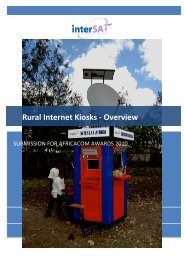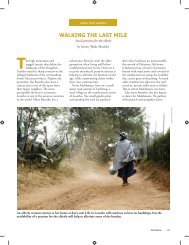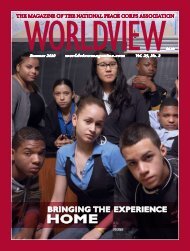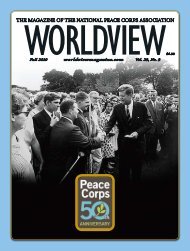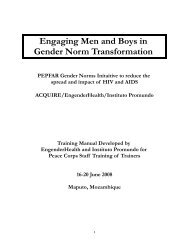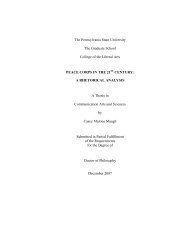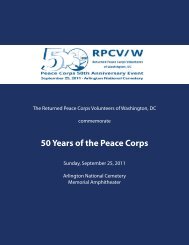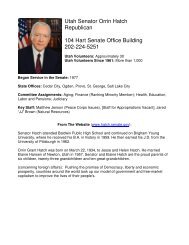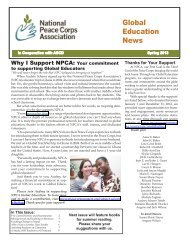here. - National Peace Corps Association
here. - National Peace Corps Association
here. - National Peace Corps Association
Create successful ePaper yourself
Turn your PDF publications into a flip-book with our unique Google optimized e-Paper software.
Talking Points for Stacy Rhodes<br />
NPCA Annual Gathering – Minneapolis<br />
FINAL DRAFT<br />
I. Introduction <br />
Thank you, Kevin, for that kind introduction. I am very happy that a person of your great <br />
experience serves as the President of the NPCA. It is a pleasure and an honor to be with you <br />
all today at the <strong>National</strong> <strong>Peace</strong> <strong>Corps</strong> <strong>Association</strong>’s annual gathering, <strong>here</strong> in Minneapolis. <br />
And thank you to Tony Barclay and the entire NPCA board and staff for your ongoing support <br />
of the <strong>Peace</strong> <strong>Corps</strong> and its important mission. I carry the warm regards from our Director, <br />
Aaron Williams, who very much wanted to be <strong>here</strong> today, but was unable to make the trip. <br />
He asked me to extend his best wishes to you for a successful <strong>Peace</strong> <strong>Corps</strong> Connect event. <br />
I see quite a few familiar faces <strong>here</strong> today … As always, it’s a pleasure to be surrounded by <br />
fellow RPCVs. Your dedication to service and to the three goals of the <strong>Peace</strong> <strong>Corps</strong> is a <br />
wonderful reminder of what makes the <strong>Peace</strong> <strong>Corps</strong> and the extended <strong>Peace</strong> <strong>Corps</strong> family so <br />
special—the diversity of our backgrounds… the intensity of our commitment… and the bonds <br />
of great friendship that endure, across the boundaries of geography and time. <br />
Just as an example of this, I met my best friend today, Steve Huffstutlar, at <strong>Peace</strong> <strong>Corps</strong> <br />
training in Logan, Utah, in July 1968 – exactly 44 years ago. After 2 years on the Bolivian <br />
Altiplano we somehow stayed in touch; even without Facebook, email, or texting; and <br />
actually wound up working closely together in Guatemala following the peace accords in the <br />
late 90s. Steve went on to work for Tony Barclay in a number of countries – including Bolivia <br />
which shows it is indeed a “small world” for RPCVs, and it’s clearer than ever how our <strong>Peace</strong> <br />
<strong>Corps</strong> service overseas leads to many important connections, both personal and professional. <br />
So while I am now currently serving as <strong>Peace</strong> <strong>Corps</strong>’ Chief of Staff, I am first and foremost a <br />
Returned <strong>Peace</strong> <strong>Corps</strong> Volunteer. And I feel incredibly fortunate to be able to again serve an <br />
organization that I have loved so much for so long… and especially lucky to be able to have <br />
done so during the 50th anniversary last year, which so many of you celebrated with us. <br />
Last year, fifty years after our founding by President Kennedy and Sargent Shriver, we <br />
honored their, and our, legacy in many different ways… and in the process, we helped renew <br />
our faith in the power of service to bolster friendship and peace. <br />
1
I would certainly be remiss if I didn’t publicly thank everybody at NPCA—the board, staff, and <br />
members—for helping make last year’s celebration such a great success. We shared some <br />
wonderful events and moments in Washington, D.C., namely the extraordinary NPCA Gala, as <br />
well as the incredibly moving events at Arlington <strong>National</strong> Cemetery the following day, <br />
organized with <strong>Peace</strong> <strong>Corps</strong> and NPCA by the RPCV Washington area group. The march of the <br />
<strong>Peace</strong> <strong>Corps</strong> countries’ flags from Arlington across the Potomac was a sight to behold. <br />
But I know that some of the most significant remembrances, and greatest fun, were had in <br />
the numerous reunions and 50 th events sponsored by area RPCV groups and “Friends” groups <br />
around the country. Right <strong>here</strong> in Minneapolis, t<strong>here</strong> were numerous events commemorating <br />
our anniversary, including a reception on March 21, 2011 honoring Minnesota <strong>Peace</strong> <strong>Corps</strong> <br />
Volunteers and RPCVs at the Hubert H. Humphrey Institute of the University of Minnesota, as <br />
well as an extraordinary presentation I heard about in early April of last year by RPCV Juliet <br />
Kosarzycki (Ko-‐zar-‐ski), on her experience empowering young women in Albania from 2006 to <br />
2008. <br />
Through the combined efforts of <strong>Peace</strong> <strong>Corps</strong>, the NPCA, and RPCV groups, as well as <br />
individual RPCVs and currently serving Volunteers, our special anniversary was celebrated in <br />
every state and in more than 100 countries around the world. On behalf of everyone at <strong>Peace</strong> <br />
<strong>Corps</strong> headquarters, for all that was done to mark this historic moment, thank you, thank <br />
you, thank you. <br />
The one thing I think we all realized during our 50 th anniversary commemoration is that the <br />
passion for service in this country is as alive today as it was 51 years ago… <br />
II.<br />
Agency Update <br />
And so we move forward with anticipation. This is an extraordinary time for the <strong>Peace</strong> <strong>Corps</strong>. <br />
We have very strong support from our President, the First Lady, and the Secretary of State. To <br />
give you a sense of the enthusiasm and energy we’re feeling, allow me to share a brief update <br />
on the <strong>Peace</strong> <strong>Corps</strong> and what we look to in the future. <br />
First, the number of <strong>Peace</strong> <strong>Corps</strong> Volunteers out in the field is at a 40-‐year high, with 9,100 <br />
Volunteers serving in 75 countries around the world. While our budget limitations kept us <br />
from reaching our goal of 10,000 Volunteers by the anniversary, we are at a level not seen <br />
since 1970. We of course hope that our budget will allow for additional growth down the <br />
2
oad, but for the near term, the cuts we suffered for FY 2011 will more likely require some <br />
retrenchment in overall presence levels. <br />
But, some good news is that despite the often acrimonious overall political climate and <br />
stringent budget appropriations we’ve had -‐-‐ <strong>Peace</strong> <strong>Corps</strong> continues to enjoy strong <br />
bipartisan support in Washington. Last February, the President submitted <strong>Peace</strong> <strong>Corps</strong>’ 2013 <br />
budget request of $375 million to Congress in mid-‐February, and the reaction so far from <br />
both the House and Senate has been positive. If passed, this would keep us essentially level <br />
with our current budget. <br />
Frankly, in today’s fiscal climate, <strong>Peace</strong> <strong>Corps</strong> is relatively fortunate to continue to maintain <br />
the same budget level in the last two fiscal years…And as Congress moves forward with its <br />
spending bills, we will continue to follow the appropriations process closely. When he is not <br />
out in the field, Director Williams spends more time on Capitol Hill discussing <strong>Peace</strong> <strong>Corps</strong>’ <br />
work with key legislators than on any other activity in Washington, and he has been very <br />
effective in maintaining critical bipartisan support of the agency. <br />
Notwithstanding the budgetary constraints, <strong>Peace</strong> <strong>Corps</strong> is actively working to implement the <br />
modernization initiatives we started in 2009. Two years ago we submitted a Comprehensive <br />
Agency Assessment Report to Congress, outlining a new vision and strategies that focus on <br />
quality improvements that will guide the <strong>Peace</strong> <strong>Corps</strong> over the next decade…for anyone <br />
interested, the full assessment can be accessed through the <strong>Peace</strong> <strong>Corps</strong> website…Let me <br />
briefly highlight just a couple of these strategies and how they’re making a difference at the <br />
<strong>Peace</strong> <strong>Corps</strong>. <br />
Strategy #1 recommended by the Comprehensive Assessment is to better target our limited <br />
resources overseas. To implement this strategy, we have developed an annual strategic <br />
portfolio review, which is used to carefully inform decisions about potential country <br />
openings, country closures, as well as allocation of Volunteers. Each country with a <strong>Peace</strong> <br />
<strong>Corps</strong> presence, as well as those that have requested our presence, are reviewed, using a <br />
number of key criteria, including Volunteer safety, the country’s need (as measured by the <br />
HDI), extent of host government engagement and support, etc. <br />
As a result of these annual reviews we have found it necessary to close four posts over the <br />
past two years: Mauritania, Bolivia, Niger, and Kazakhstan. These painful decisions were <br />
based on several key factors feeding into the portfolio review, of which the safety of <br />
Volunteers was paramount. Similarly, we are in the process of a phase down in Bulgaria, <br />
Romania, Cape Verde, and Suriname. <br />
3
At the same time, <strong>Peace</strong> <strong>Corps</strong> Volunteers have been requested by a number of countries, <br />
and numerous countries have asked for additional PCVs. Seldom does a month go by that we <br />
are not meeting with one or more ambassadors or government officials seeking either an <br />
increase in a current program size or a new entry or re-‐entry by <strong>Peace</strong> <strong>Corps</strong>. In 2010, we <br />
were pleased to return to Sierra Leone, Colombia, and Indonesia, and earlier this year we <br />
announced that <strong>Peace</strong> <strong>Corps</strong> is once again returning to Tunisia and Nepal, both revered <br />
“<strong>Peace</strong> <strong>Corps</strong> countries.” <br />
The first group of returning <strong>Peace</strong> <strong>Corps</strong> Volunteers is scheduled to arrive in Tunisia this <br />
fall…w<strong>here</strong> Volunteers will work in English language training and youth development, and <br />
will undoubtedly play an important part in helping to build that country’s new democracy. <br />
And our first class of new Volunteers will arrive in Nepal in September, after a proactive <br />
effort by the Government of Nepal to assure <strong>Peace</strong> <strong>Corps</strong>’ return. <br />
We have also completed initial assessments in several other countries w<strong>here</strong> <strong>Peace</strong> <strong>Corps</strong> has <br />
been proactively requested, including South Sudan, Bangladesh, and Haiti, and we are <br />
reviewing the feasibility and costs of opening these programs. The security situation remains <br />
our paramount concern in these countries. <br />
As exciting as it is to enter or reenter countries, it is equally difficult for us to leave countries, <br />
communities, and friends elsew<strong>here</strong>. Nonetheless, our portfolio review has enabled us to <br />
apply standardized criteria and strategically review our impact in these countries, assuring us <br />
the opportunity to make the best use of scarce resources. <br />
Strategy #2 from the Comprehensive Assessment has helped focus our attention on the need <br />
for more carefully targeted, effective program interventions, accompanied by higher quality <br />
technical training. Through an initiative we’re calling Focus-‐In and Train Up (FITU), we are <br />
scaling-‐up a limited number of our most effective projects, and providing more intensive <br />
technical training and support to Volunteers working in these areas. Posts are being asked to <br />
focus their programs and concentrate training resources on the highest priority projects. With <br />
the active advice and counsel of staff from overseas posts, the early focus of our enhanced <br />
FITU programming and training has been primarily in education and in health, specifically <br />
including teaching English as a second language, and our major HIV/AIDS education and <br />
prevention program. Posts are responding to this challenge with great enthusiasm. <br />
One particularly exciting – and so far successful -‐-‐ example of our efforts to focus in and train <br />
up is our “Stomping Out Malaria” initiative in Africa. In collaboration with the President’s <br />
4
Malaria Initiative (PMI), <strong>Peace</strong> <strong>Corps</strong> and its partner organizations have developed a <br />
campaign to mobilize more than 3,000 Volunteers across Africa to engage in the fight against <br />
malaria. In its first six months, the initiative has been launched in 17 African countries. <strong>Peace</strong> <br />
<strong>Corps</strong> Volunteers and staff from across West Africa participate in two-‐week “malaria boot <br />
camps” in Senegal, with training provided by experts from PMI, CDC, USAID, Malaria No More <br />
(NGO), Johns Hopkins School of Public Health, and other partner organizations. <br />
This initiative was based in very large part on a successful malaria program effort by <strong>Peace</strong> <br />
<strong>Corps</strong>/Senegal. Volunteers t<strong>here</strong> had been instrumental in distributing bed nets in high-incidence<br />
districts of rural Senegal and working directly with communities and families on <br />
their proper and consistent use. As a result, malaria cases for children under age five <br />
decreased from 40 percent to 7 percent in those districts w<strong>here</strong> the <strong>Peace</strong> <strong>Corps</strong> and its <br />
partners worked. <br />
These are just a few examples of what’s going on at <strong>Peace</strong> <strong>Corps</strong>…In the past two years, great <br />
progress has been made in advancing the strategies and recommendations outlined in the <br />
Comprehensive Assessment, and we will continue to do more, especially as the budget <br />
permits. <br />
III.<br />
Third Goal <br />
Let me speak about the 3 rd goal for a moment. <br />
This <strong>Peace</strong> <strong>Corps</strong> priority involves everyone in this room. Director Aaron Williams wants to <br />
enhance the <strong>Peace</strong> <strong>Corps</strong>’ efforts to draw on the passion and perspective of returned <br />
Volunteers like you—to educate Americans about the world we share… and to spread the <br />
<strong>Peace</strong> <strong>Corps</strong>’ spirit of service across the United States. <br />
To this end, in February of this year, we created a new and independent Office of Third Goal <br />
and Returned Volunteer Services, to elevate the Third Goal and increase the career and <br />
transition services we provide to RPCVs. This office is spearheading efforts to engage and <br />
support our returned Volunteers… and to elevate the Third Goal to its rightful place and <br />
prominence. <br />
The Director of this new office, Eileen Conoboy, is <strong>here</strong> with us today…Eileen, please <br />
stand…Eileen is an RPCV from Mali, and also the former <strong>Peace</strong> <strong>Corps</strong> Regional Office Manager <br />
in Seattle, Washington. Also <strong>here</strong> from Eileen’s team is Lynn Kneedler, RPCV Tanzania and the <br />
former <strong>Peace</strong> <strong>Corps</strong> Regional Office Manager of the Mid-‐Atlantic Recruiting Office. Please <br />
5
stand, Lynn. Both of them will be <strong>here</strong> this weekend, and Eileen will be facilitating a session <br />
on Sunday at the Third Goal Expo to get your ideas and input. She’ll also be providing updates <br />
on new Third Goal plans-‐in-‐the-‐making. She wants to hear from you so please track her <br />
down, and don’t feel you need to wait until Sunday to give her an earful! <br />
One priority that Eileen’s office has identified, which we feel very strongly about, is to do <br />
everything in our power to elevate <strong>Peace</strong> <strong>Corps</strong> links to and support of geographic and <br />
country-‐of-‐service-‐based RPCV groups. This is w<strong>here</strong> the best Third Goal ideas and events <br />
originate, and w<strong>here</strong> the rubber meets the road on addressing the 3 rd goal. Just this month, <br />
Eileen’s office started a Third Goal Spotlight on the <strong>Peace</strong> <strong>Corps</strong> website to showcase some of <br />
the extraordinary things being done around the country by groups and individuals, like many <br />
of you in the audience today. <br />
Indeed, the Minnesota RPCV group was the first group to be placed in the spotlight and <br />
lauded for the important and creative call to service that the group issued through their <br />
Service Passport program – which calls for 51 hours of service in honor of <strong>Peace</strong> <strong>Corps</strong>' 51st <br />
anniversary, this year. <br />
The Minnesota Returned <strong>Peace</strong> <strong>Corps</strong> Volunteers group stands in great company with other <br />
RPCV groups such as the Chicago Area <strong>Peace</strong> <strong>Corps</strong> <strong>Association</strong> and the Friends groups for <br />
many countries, who are active via the <strong>Peace</strong> <strong>Corps</strong> Partnership program in supporting PCV-managed<br />
community projects. Whether you’re helping support Volunteer projects overseas <br />
– or you’re helping recruit the next generation of <strong>Peace</strong> <strong>Corps</strong> Volunteers by talking to your <br />
neighbors and co-‐workers – or you’re giving presentations in classrooms or at Rotary Club <br />
meetings – you’re doing your part to advance the Third Goal. <br />
[Hold for applause] <br />
IV.<br />
<strong>Peace</strong> <strong>Corps</strong> Response <br />
Finally, I’d like to shed some new light on one other exciting program that is just beginning to <br />
expand and take off in a new direction. <br />
<strong>Peace</strong> <strong>Corps</strong> Response is one of the Agency’s most innovative programs, and has been <br />
providing RPCVs with a second opportunity to serve overseas since it was first established as <br />
the Crisis <strong>Corps</strong>. In January we announced the expansion of <strong>Peace</strong> <strong>Corps</strong> Response, opening <br />
the program for shorter-‐term service terms to both returned Volunteers and now as well to <br />
6
highly-‐skilled Americans with at least a decade of work experience and proven capacity to <br />
adapt across cultures, including those who were not formerly <strong>Peace</strong> <strong>Corps</strong> Volunteers. <br />
On April 30 th , Dorothy Burril, a 73-‐year old woman from Cape Cod, Massachusetts, began a <br />
six-‐month assignment as the first American without previous <strong>Peace</strong> <strong>Corps</strong> service to <br />
volunteer in the expanded <strong>Peace</strong> <strong>Corps</strong> Response program. Dorothy was a perfect fit…using <br />
her lengthy experience working in education systems in the U.S. and degrees from Boston <br />
University and Harvard Kennedy School. After arriving in Jamaica, she wrote that she “might <br />
just well be the happiest new Volunteer in <strong>Peace</strong> <strong>Corps</strong> history loving every minute of this <br />
experience.” <br />
Another Response Volunteer, Janet Forte, also serving for the first time with <strong>Peace</strong> <strong>Corps</strong>, left <br />
this month for the Philippines, to serve as a Drug Rehabilitation Officer for the Philippines <br />
Department of Health. Like Dorothy, Janet came to us with very strong technical skills, proven <br />
adaptability, and good experience in international development. <br />
Today, we are lucky to have the Deputy Director of <strong>Peace</strong> <strong>Corps</strong> Response, Heather Schwenk, <br />
with us <strong>here</strong>. Heather, please stand. Heather is an RPCV from the Dominican Republic and if <br />
you get a chance, I strongly encourage you to speak with her this weekend to learn more <br />
about <strong>Peace</strong> <strong>Corps</strong> Response. She’s a dynamo, and our Response program is on the march. So <br />
check out the website for current opportunities to go back overseas for a new Volunteer <br />
experience. At the same time, I urge you to think about your own friends or relatives who <br />
may not have been PCVs, but might make great candidates for the new pilot program in <br />
<strong>Peace</strong> <strong>Corps</strong> Response. I’m sure each of you knows someone who “always wished they could <br />
be a <strong>Peace</strong> <strong>Corps</strong> Volunteer” and who would have been a great one—that’s who we are <br />
looking for. <br />
Just before concluding, I’d like to also quickly introduce a couple of other great members of <br />
the headquarters team who came out to Minneapolis for this event: Buck Buckingham, the <br />
extraordinary Director of our Office of Global Health and HIV; and Chuck Hobbie, one of our <br />
supportive lawyers who is an RPCV/Korea. <br />
V. Conclusion <br />
I’ll close today with a quote from a man I have always revered, since the 1960s– <strong>Peace</strong> <strong>Corps</strong>’ <br />
guiding light and founding director, Sargent Shriver. Mark Shriver, Sarge’s son and someone <br />
we talk to frequently in Washington, has recently written a very touching memoir about his <br />
father and he tells this story about this Good Man. In 1994, when he was 78 years old, Sarge <br />
7
addressed the graduating class of his own alma mater, and said, in his inimitable, ebullient <br />
style: <br />
“I have one small word of advice for you.”—he told the Yale seniors—“Break your mirrors! <br />
Yes, indeed—shatter the glass. In our society that is so self-‐absorbed, begin to look less at <br />
yourself and more at each other. Learn more about the face of your neighbor, and less about <br />
your own… <br />
When you get to be 30, 40, 50, or even 70 years old, you’ll get more happiness and <br />
contentment out of counting your friends than counting your dollars. <br />
You’ll get more satisfaction from having served your neighborhood, your town, your state, <br />
your country, and your fellow human beings than you’ll ever get from your muscles, your <br />
figure, your automobile, your house, or your credit ratings. <br />
You’ll get more from being a peacemaker than a warrior. And I’ve been both, so I speak from <br />
experience. So break the mirrors!” <br />
The legacy of Sarge Shriver lives on in the <strong>Peace</strong> <strong>Corps</strong>, and in the hearts of the RPCVs. <br />
Thank you for your service…past, current, and future.. <br />
8




